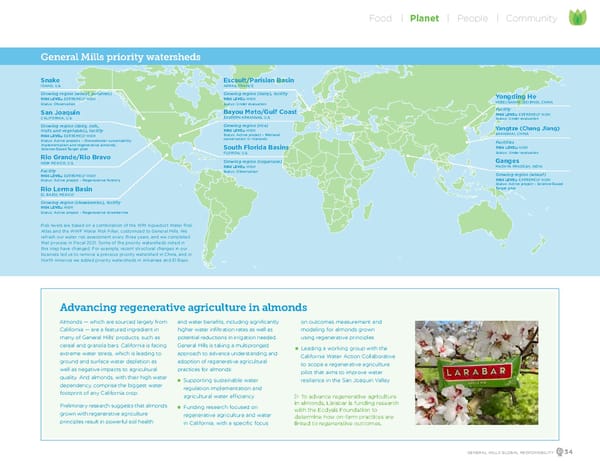Yongding He HEBEI/S ANHE (BEIJING), CHINA Fa cility RISK LEVEL: EXTREMEL Y HIGH Status: Under evaluation Yangtz e ( Chang Jiang) SHANGHAI, CHINA Fa cilities RISK LEVEL: HIGH Status: Under evaluation Ganges MADHYA PRADESH, INDIA Gro wing region (wheat) RISK LEVEL: EXTREMEL Y HIGH Status: A ctiv e pr oject – Scienc e-Based Ta rget pilot San Joaquin CALIFORNIA, U .S. Gro wing region ( dairy , nuts, fruits and v egetables ), f acility RISK LEVEL: EXTREMEL Y HIGH Status: A ctiv e pr ojects – Gr oundw ater sustainability implementation and r egener ativ e almonds; Scienc e-Based Ta rget pilot Rio Gr ande/Rio Br avo NEW MEXIC O, U.S. Facility RISK LEVEL: EXTREMEL Y HIGH Status: A ctiv e pr oject – Regener ativ e fo restry Gro wing region (wheat, potatoes ) RISK LEVEL: EXTREMEL Y HIGH Status: Observ ation Risk le vels ar e based on a c ombination of the WRI Aq ueduct Wa ter Risk Atlas and the WWF Wa ter Risk Filt er, customiz ed to Gener al Mills. We refresh our wa ter risk assessment every thr ee y ears, and we complet ed that pr ocess in Fiscal 2021. Some of the priority wa tersheds not ed in this map ha ve changed. F or ex ample, recent structur al changes in our business led us to remo ve a previous priority wa tershed in China, and in North America we added priority wa tersheds in Arkansas and El Bajio . Rio Lerma Basin EL BAJÍ O, MEXIC O Gro wing region (strawberries ), f acility RISK LEVEL: HIGH Status: A ctiv e pr oject – Regener ativ e st rawberries Snak e IDAHO , U .S. South Florida Basins FL ORID A, U .S. Gro wing region ( sugarcane ) RISK LEVEL: HIGH Status: Observ ation Gro wing region ( dairy), f acility RISK LEVEL: HIGH Status: Under evaluation Escault/Parisian Basin ARRA S, FRANCE Gro wing region (ric e) RISK LEVEL: HIGH Status: A ctiv e pr oject – W etland conserv ation in ric elands Ba you Met o/Gulf Coas t EA ST ERN ARK ANS AS , U .S. General Mills priority watersheds Almonds — which are sourced largely from California — are a featured ingredient in many of General Mills’ products, such as cereal and granola bars. California is facing extreme water stress, which is leading to ground and surface water depletion as well as negative impacts to agricultural quality. And almonds, with their high water dependency, comprise the biggest water footprint of any California crop. Preliminary research suggests that almonds grown with regenerative agriculture principles result in powerful soil health and water benefits, including significantly higher water infiltration rates as well as potential reductions in irrigation needed. General Mills is taking a multipronged approach to advance understanding and adoption of regenerative agricultural practices for almonds: n Supporting sustainable water regulation implementation and agricultural water efficiency n Funding research focused on regenerative agriculture and water in California, with a specific focus on outcomes measurement and modeling for almonds grown using regenerative principles n Leading a working group with the California Water Action Collaborative to scope a regenerative agriculture pilot that aims to improve water resilience in the San Joaquin Valley Advancing regenerative agriculture in almonds w To advance regenerative agriculture in almonds, Lärabar is funding research with the Ecdysis Foundation to determine how on-farm practices are linked to regenerative outcomes. GENERAL MILLS GLOBAL RESPONSIBILITY 34 Food Planet People Community
 GeneralMills Global Responsibility Report Page 35 Page 37
GeneralMills Global Responsibility Report Page 35 Page 37